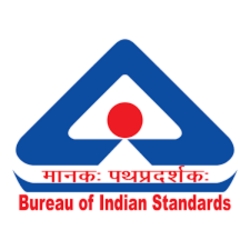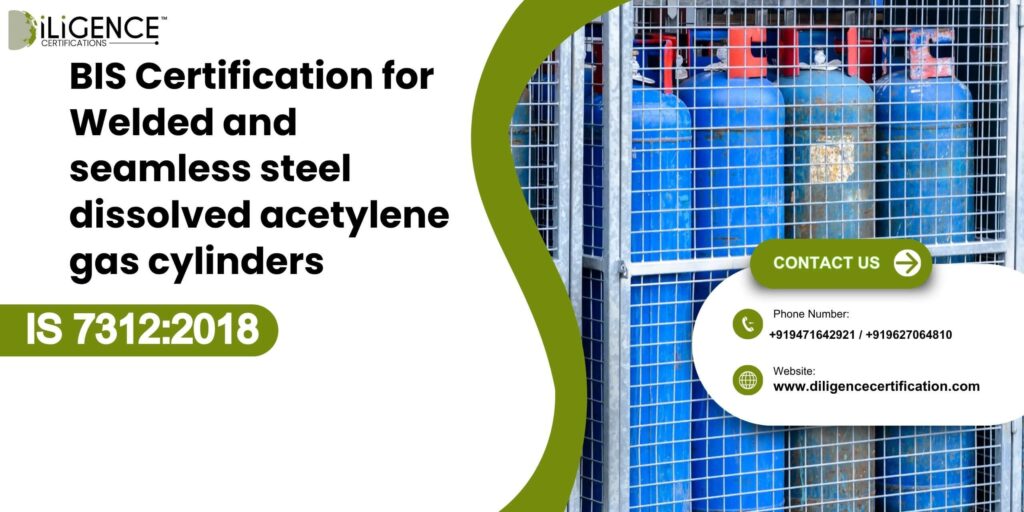- Mandatory BIS certification applies to dissolved acetylene gas cylinders.
- Standard covers welded and seamless steel cylinder types.
- Certification under ISI Mark Scheme-I with factory inspection and testing.
- Safety testing includes hydrostatic and burst tests.
- BIS Product Manual defines required equipment and inspection procedures.
Introduction

IS 7312:2018 provides specifications for welded and seamless steel cylinders used for the storage of dissolved acetylene gas. Acetylene is a highly flammable gas, and it can become unstable when under high pressure; therefore the design of these cylinders incorporates porous mass, a solvent and other materials to permit the safe storage of acetylene in a gaseous form. This standard specifies the fabrication materials, the design, the method of manufacture as well as the acceptable safety performance levels and detailing and testing requirements, including hydrostatic and burst testing. Compliance with this standard assures safe and reliable performance and ensures the cylinder can be used within an industrial application under Indian regulation. Bureau of Indian Standards
What is IS 7312:2018?
IS 7312:2018 is the Indian Standard that governs welded and seamless steel cylinders to safely hold dissolved acetylene gas. It covers the design, material, construction, and safety requirements of the cylinder. The standard accounts for the inherently hazardous characteristics of acetylene by requiring a porous mass, a filling solvent, and testing. In complying with the standard, one is assured of safe storage, transport, and use in industry.
Key Points

- Applies to portable steel acetylene cylinders with porous mass and solvent inside.
- Specifies steel material, welding, and construction requirements.
- Includes mandatory safety tests like hydrostatic and burst tests.
- Requires permanent markings for clear identification and safety information. ISI MARK
Why BIS Certification Mandatory for Welded and seamless steel dissolved acetylene gas cylinders
- Acetylene being a flammable and unstable gas, safety standards for the gas cylinder must be rigorous.
- BIS certification demonstrates that the materials, design construction, tests (including burst, hydrostatic and leakage tests), and markings all come from the required standard (IS 7312).
- Without BIS certification, the product cannot be sold, used, or marketed in India under the scheme, which promotes legal and regulatory compliance.
- BIS certification also provides a guarantee of traceability, accountability from the manufacturer, and quality assurance, and protects the end user and the industry they serve.
- BIS certification fosters trust in their safe use and visibility to transport regulators, and also provides proof of complying with national standard requirements for the industry they serve.
Importance & Benefits of BIS Certification
| Importance | Benefits |
| Guarantees that cylinders adhere to strict safety benchmarks for sidestepping unstable acetylene gas | Reduces the risk in case of any explosion, leaks and accidents during storage or on the road. |
| Since acetylene cylinders are sold legally in India: | Prevents regulatory penalties and allows smooth business operations |
| Assets manufacturing quality through materials composition, welding quality and testing | Improves durability, performance, and reliability over the life of the cylinder |
| Confirms product evidence history and accountability. | Supports faster corrective action and enhances customer safety confidence |
| Aligns products with national and industrial safety norms | Increases acceptance in industrial sectors and boosts market credibility |
Step by Step process of BIS Certification

Step1:Documentation
- Collect technical documents (design, drawings, raw material details).
- Prepare Quality Control manual and manufacturing process details.
- Include marking details as per the relevant BIS standard.
- Ensure traceability records and legal compliance documents are ready.
Step2:Product Testing
- Submit samples for testing in a BIS-recognized laboratory.
- Conduct all mandatory safety and performance tests as per the standard.
- Ensure test results meet specification requirements.
- Maintain complete testing records for inspection.
Step3:Application Submission
- Apply online through the BIS certification portal.
- Upload required documents and lab test reports.
- Pay applicable BIS fees (application + audit + marking).
- Assign an Authorized Indian Representative if the manufacturer is foreign.
Step4:Scrutiny and Inspection
- BIS officials examine documents and test reports thoroughly.
- A factory audit is conducted to verify equipment and production setup.
- Inspectors check product marking, traceability and QC procedures.
- Any non-compliance issues must be corrected and verified again.
Step5:Grant of License
- BIS approves if all requirements are fully complied with.
- The manufacturer receives authorization to use the ISI Mark.
- License covers specific product scope defined by BIS.
- Ongoing surveillance audits are required to maintain certification.
Documents Required for BIS Certification
| Category | Documents Required |
| Company Details | Registration, GST/Import-Export Code, Authorized Indian Representative (if foreign) |
| Product Details | Design drawings, technical specs, material information |
| Quality System | QC manual, process flow, equipment list |
| Testing | BIS-approved lab test reports, calibration certificates |
| Marking & Records | Labeling/marking details, batch and traceability records |
Timelines, Costs, Validity & Renewal
- Timelines: Certification process usually takes a couple of months.
- Costs: Includes all claims for both applications, exams, and auditing time.
- Validity: Individual certifications usually are valid for a limited amount of time then need to be renewed.
- Renewal: Ensure that your records and costs are provided on time in order to maintain your license status.
Why Choose Diligence Certifications
- Offers comprehensive assistance from paperwork to final BIS approval.
- The team has experience and excellent knowledge of Indian regulatory standards.
- Helps you address compliance dilemmas quickly reducing delays.
- Dedicated to customer satisfaction through professional advice and status updates.
- Well-suited for domestic and international manufacturers looking to get certified.
Conclusion
BIS certification for the manufacturer’s welded and seamless steel dissolved acetylene gas cylinders is critical for the safety and legal conformity while ensuring consistency in product quality as per IS 7312:2018. This avoids accidents, assures safe operations of industrial plants, and builds trust with both users and regulators. Engaging an expert agency such as Diligence Certifications will ensure a seamless and transparent process, reducing the time taken to obtain BIS certificates of compliance; ultimately increasing customer and regulatory confidence leading to business success over the long term.
Frequently Ask Questions
What is IS 7312:2018?
IS 7312:2018 is a standard issued by BIS regarding design, construction, materials, and safety requirements for storage of dissolved acetylene gas in welded and seamless steel cylinders.
Is BIS Certification required for dissolved acetylene gas cylinders in India?
Yes, all welded and seamless steel dissolved acetylene gas cylinders sold or used in India will require the ISI mark-Scheme- or BIS certification.
Why is BIS Certification required for acetylene cylinders?
BIS certification is necessary as it indicates compliance with highway safety requirements; furthermore, we have a duty to minimize explosion risks, limit our liability and to provide secure and safe operation of the product.
What safety testing is referenced in IS 7312?
IS7312 requires safety testing on the cylinders that includes hydrostatic, bursting and leak testing, where inspectors will carry out their inspections to ensure the requirements considering the inspection of the welds and the cylinder integrity.
Who applies for BIS certification for acetylene cylinders?
Manufacturers of welded or seamless steel dissolved acetylene gas cylinders will be required to obtain BIS certification prior to marketing or distributing their products regardless if they are an Indian manufacturer or foreign manufacturer.
How long does it take to receive BIS certification?
Generally, the process is accomplished in a few months, depending on the quality of the documentation provided and the outcomes of product testing and factory inspections.
What documentation is required for BIS certification according to IS 7312?
Documents required will include details of company registration information, design drawings, material specifications, a QC manual, lab test reports, calibration certificates, and product marking information.
Does BIS inspect my factory as part of the certification process?
Yes, the factory inspection process is necessary to validate the setup in which products are made, quality control processes are in place, and traceability of product will be handled.
How long is BIS certification valid?
Your license will be for a specified period of time and will need to be renewed periodically through compliance and paying a renewal fee.
Can overseas manufacturers apply for BIS certification?
Yes, however you will be required to submit an Authorized Indian Representative (AIR) to serve as the liaison for certification and legal responsibility in India.








 BIS Certification
BIS Certification
 CDSCO
CDSCO
 CPCB
CPCB
 LMPC
LMPC
 WPC Approval
WPC Approval
 Global Approvals
Global Approvals
 TEC
TEC
 ARAI
ARAI
 BEE
BEE
 ISO Certification
ISO Certification
 DGCA Certification
DGCA Certification
 NOC For Steel
NOC For Steel



















 Business Registration
Business Registration















 Legal Services
Legal Services
 Trademark Registration
Trademark Registration
 Copyright Registration
Copyright Registration
 Patent Registration
Patent Registration















































